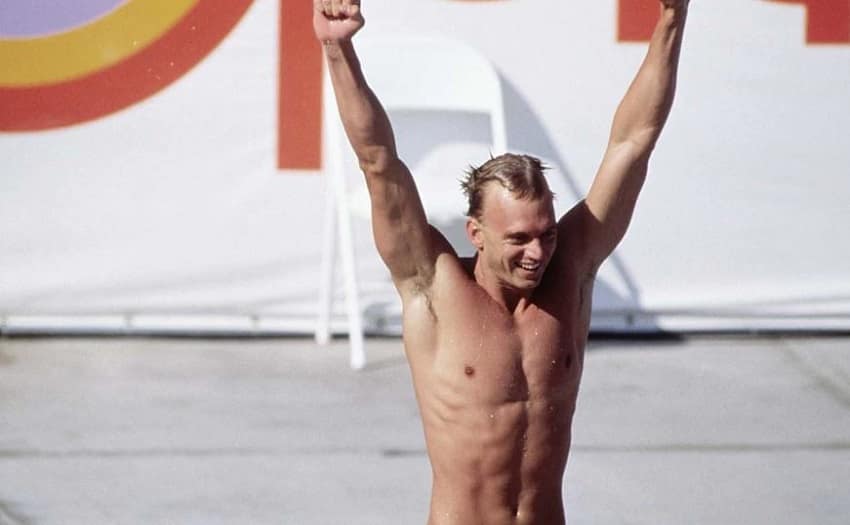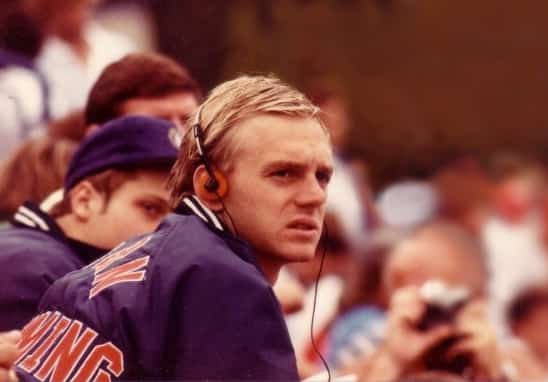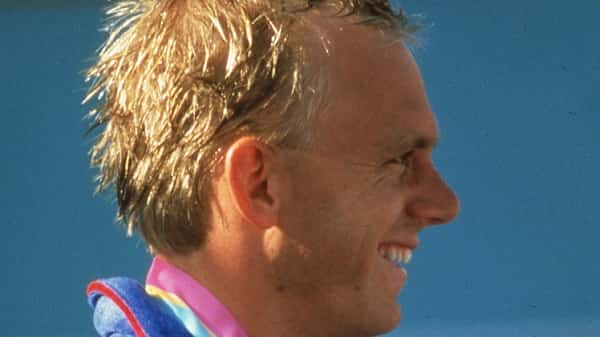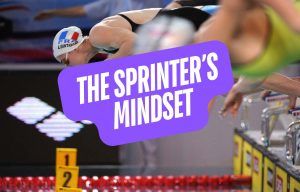On March 21, 1980, American president Jimmy Carter sat down with 160 athletes and coaches and confirmed what many were terrified of: The United States of America would be boycotting the 1980 Olympics.
The decision was final.
There would be no competing under a neutral flag (Carter threatened to revoke the passport of any American athlete who tried this). Although Carter remains the face of the decision, public opinion at the time was in favor of a boycott and congress had voted overwhelmingly in support of it.
For 21-year old Rowdy Gaines the news was devastating.
The world record holder in the 100 and 200m freestyles, Gaines was projected to win a fistful of gold medals that summer.
“I felt physically at my peak in 1980—and mentally up, too. It was tough, really tough. I had the chance for four golds.”
The next year Gaines hung up his racing suit.
He’d had a stellar NCAA career at Auburn and it was time to move on with life. There was no such thing as pro swimming back then, and financial opportunities from the sport were far and few between. It was generally expected that once a swimmer finished university that their career was over.
During his time away from the pool the sport never really left him. The Olympic dream continued to claw at his thoughts.
Finally, a conversation with his father made him realize that he would forever have that what if… lingering in the back of his mind. The sport, and the unfulfilled dream of competing at its highest level, would tug at him until he’d done it.
“Can you look at yourself in the mirror for the rest of your life and say ‘what if?’ Can you look at the Olympic rings and say, ‘what if?’” Rowdy’s father told him.
After a six month hiatus, Gaines got back into the water. But the trip to the Los Angeles Games was not without trial.
At the 1983 Pan Am Games he swam terribly. He didn’t improve on any of his times and failed to win the 200m freestyle, an event that he’d held the world record.
“For the first time, I felt old. I had doubts. I sat down with my parents, my coaches, and my friends, all of whom really helped me. And in the end, I decided to go for it — win, lose, or draw — because otherwise I would never know,” said Gaines.
At the US Olympic Trials in 1984 he failed to qualify for the team in the 200m freestyle. He was even unable to qualify for the 4×200 freestyle relay—an event that had its own epic drama in Los Angeles.
The Future is Now
We’ve all made less-than-great decisions at some point under impulse or from emotion.
We give up in the middle of the main set because we aren’t making the interval. We quit on something because it’s not going our way. Or we decide to not go to practice tonight because we aren’t “feeling it.”
Making rash decisions in the moment at the expense of tomorrow’s success is something we all struggle with.
In a research paper aptly titled, The Future is Now, researchers took a group of participants and had them sit down and talk about either positive future events (the future thinking group) or talk about an event that had happened to someone else recently (the control).
The women were then asked to talk about some of their favorite foods (in particular the naughty ones that we all struggle with—pizza, cheeseburgers, and so on) and then were unleashed for 15-minutes on their favorite foods.
The ones who had performed the future thinking exercise ate 25% less of the comfort foods, showing that they’d learned a sense of delayed gratification simply by having talked about positive future outcomes. Talking about a positive future outcome had the effect of teaching them to make better decisions in the present.
What does this mean for you, the enterprising swimmer with big goals in the pool?
That by regularly reminding yourself of the things you will accomplish and experience tomorrow by virtue of your good actions today you strengthen your self-control.
- Sure, you don’t want to go to practice tomorrow morning… But you know that you will feel good about yourself when you finish it.
- Yeah, crushing a large pizza in one sitting seems like a great idea now… But you will thank yourself an hour from now when you aren’t feeling like a bloated mess.
- And yes, giving up during the main set might seem attractive in the moment… But you know that if you don’t that you’ve just brought yourself that much closer to your goals.
We all make impulse-based decisions from time to time that we come to regret later. Thinking about, or writing out, the better-case future will help you make better decisions today.
For Rowdy Gaines, not giving the Olympics another shot was something he knew he’d come to regret. Despite crashing mentally in 1982 and 1983 Gaines knew he had to give it all in Los Angeles. Projecting the things he would feel in the future was enough to help him commit today.
“Twenty years from now when I looked back, I knew it would be pretty sad to think that I hadn’t given it all I had,” he said.
“The happiest person in Los Angeles”
On the night of July 31, the 25-year old Gaines got up on the block for the final of the 100m freestyle.
Earlier that day his coach Richard Quick had given him what would be a fortuitous piece of advice. The starter had been pulling the trigger on the gun quickly that week in Los Angeles. Quick told Gaines to get down into a “set” position as fast as possible and to avoid rolling back so that he’d be ready to go.
Sure enough, it was a quick start, with Gaines the only swimmer in the final “set”. He pulled away on the second 50m, touching in 49.80. Gaines looked at the scoreboard in disbelief before rapturous joy took over.
In that moment under a golden California sun, Gaines clenched his fists and shot them to the sky. Suddenly all the doubt, the uncertainty washed away.
“When I won that gold medal in the 100, without a doubt I was the happiest person in Los Angeles. Nobody could have been happier than I was that day.”
He knew that whatever trials he’d experienced, they’d been lessons. With the passing of time, he even came to appreciate the hardship of the boycott.
“I learned a lot more about myself in 1980 than I did in 1984,” he said.
Swim today with future you in mind.
All too often the things we do in the water and out of it are governed by impulse. We ignore or discount our goals in the future to satisfy an urge or craving in the present.
Stay on top of this creating an environment that supports your goals, making the hard thing easier to do. Write out your goals and keep them visible, so that you know what you are grinding for. By having a process that gives your daily training meaning.
The next time you are struggling with motivation, or are debating whether to head-butt that bag of chips with your mouth, think ahead:
What would tomorrow you thank you for?
How much closer will you be to your goals tomorrow by doing the “hard” stuff today?
*
More Stuff Like This:
Alex Popov and the Power of Training the Way You Race. The performances we drop in competition are merely reflections of what we do in training.
Olympic Champion Duncan Armstrong on Dreaming Big and Training Bigger. Australian Duncan Armstrong pulled off one of the biggest upsets in the 1988 Seoul Olympics. Here’s how he did it.














